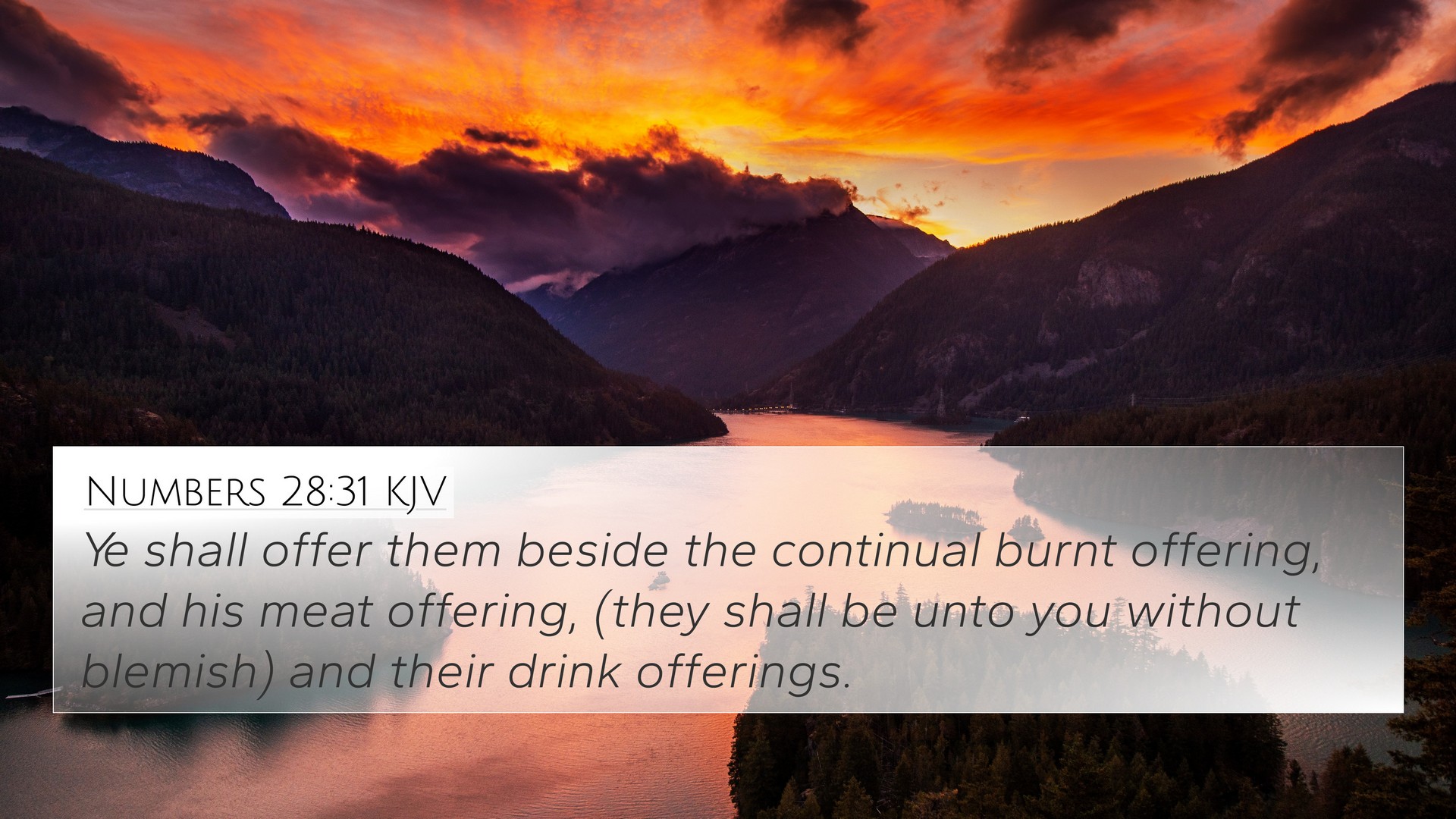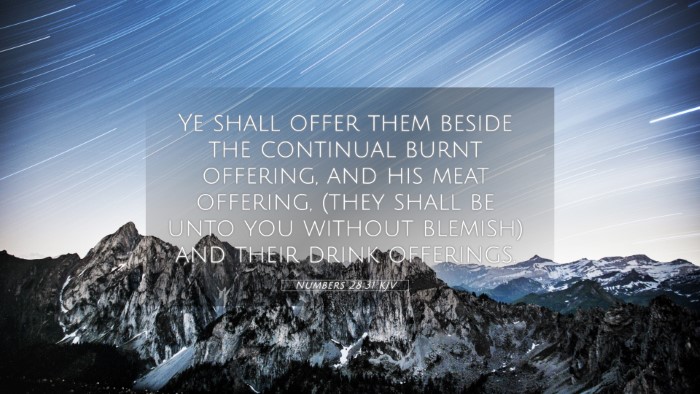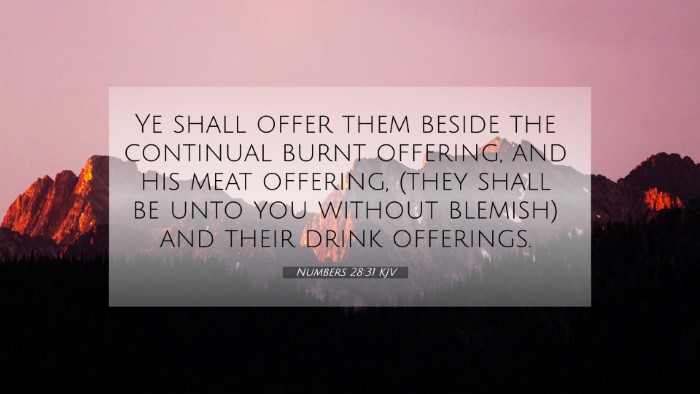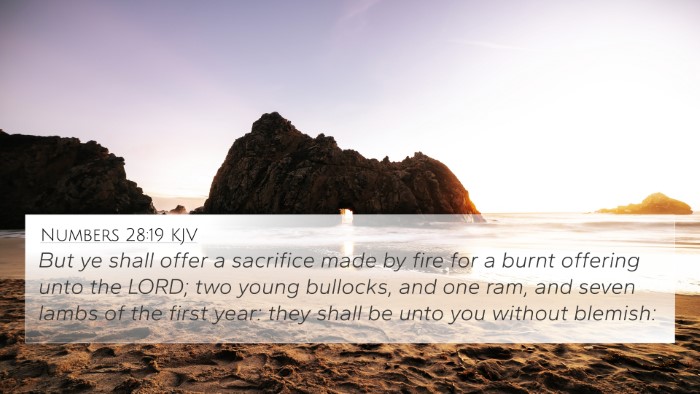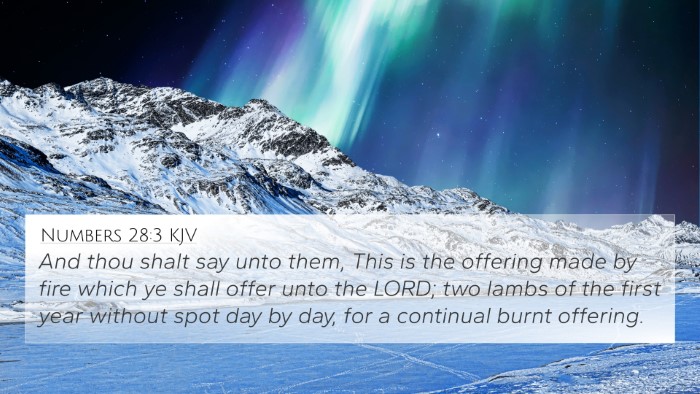Understanding Numbers 28:31
Numbers 28:31 states: "And ye shall offer them without blemish and their meat offering, even a grain offering, shall be of flour mingled with oil, and the drink offering thereof shall be of wine, the fourth part of an hin." This verse provides detailed instructions for the offerings that the Israelites were to present to God, emphasizing the importance of perfection and the specific components of these offerings.
Meaning and Significance
According to Matthew Henry's commentary, this verse highlights the stipulations for acceptable offerings to the Lord, underlining that what is presented in worship must be flawless and dedicated carefully. The flour represents the sustenance God provides, while the oil signifies anointing and the wine symbolizes joy and celebration. Together, these ingredients speak to the holistic nature of worship that encompasses both material and spiritual aspects.
Albert Barnes elaborates on the necessity of offering without blemish, indicating that this reflects God's holiness and the moral imperative for believers to present themselves in purity before Him. Additionally, the specific ratios provided for the meat and drink offerings point to an orderly approach to worship, showcasing that God values structure and intention.
Adam Clarke further illustrates the cultural context of these offerings, remarking on the strong agricultural symbolism in the biblical text. The offerings represent not just ritual compliance but also an acknowledgment of God as the provider of all good things. The mingling of oil with flour can be seen as an act of thanksgiving for God's blessings, promoting a theme of gratitude in worship.
Thematic Bible Verse Connections
This verse can be examined through the lens of various related scriptures. Below are several Bible cross references that illuminate the themes found in Numbers 28:31:
- Leviticus 1:3 - "If his offering be a burnt sacrifice of the herd, let him offer a male without blemish." This verse echoes the theme of presenting perfect offerings.
- Exodus 30:9 - "Ye shall offer no strange incense thereon, nor burnt sacrifice, neither meat offering; neither shall ye pour drink offering thereon." This emphasizes the purity and specificity required in offerings.
- Hebrews 9:14 - "How much more shall the blood of Christ, who through the eternal Spirit offered himself without spot to God." This ties back to the concept of perfection embodied in the offerings.
- Romans 12:1 - "I beseech you therefore, brethren, by the mercies of God, that ye present your bodies a living sacrifice, holy, acceptable unto God." This verse draws parallels between Old Testament offerings and New Testament calls to holiness in our lives.
- 1 Peter 2:5 - "Ye also, as lively stones, are built up a spiritual house, an holy priesthood, to offer up spiritual sacrifices, acceptable to God by Jesus Christ." This reflects the transformed way of offering spiritual sacrifices in the New Covenant.
- Psalms 51:17 - "The sacrifices of God are a broken spirit: a broken and a contrite heart." This emphasizes the internal aspect of worship that goes beyond mere external offerings.
- Malachi 1:8 - "And if ye offer the blind for sacrifice, is it not evil? and if ye offer the lame and sick, is it not evil?" This underscores the necessity of giving our best to God.
Tools for Bible Cross-Referencing
Understanding connections between Bible verses can greatly enhance one's study of Scripture. Here are some tools and methods to aid in this pursuit:
- Bible Concordance - A comprehensive tool that lists words and their occurrences throughout the Bible, aiding in thematic exploration.
- Bible Cross-Reference Guide - A resource for discovering related scriptures that provide additional context or commentary.
- Cross-Reference Bible Study - Engaging in studies where verses are analyzed in relation to one another to uncover deeper meanings.
- Bible Reference Resources - Various publications and online databases that compile extensive lists of cross-references.
- How to Use Bible Cross-References - Learning to effectively utilize these tools can lead to enriching personal Bible study and sermon preparation.
Conclusion
In summary, Numbers 28:31 is a pivotal verse that encapsulates the importance of purity, intentionality, and gratitude in worship. By employing cross-referencing methods, believers can explore broader themes throughout Scripture and gain a more profound understanding of their faith. The connections made between Old Testament practices and New Testament teachings reinforce the continuity of God's standards and expectations for His people.
